Are you out of options on how to deal with constant, overwhelming stress? Do you feel a hollow inside you somewhere that seems to suck your happiness and peace? This happens because your physical and mental wellbeing is misaligned.
Hectic routines and anxiety-inducing commitments build stress that results in illnesses. This blog post can effectively answer your unasked question, “How can I achieve a balance in life?”.
What Does “Balance in Life” Actually Mean?
Mind-body balance means a harmony between your mental and physical health. Like a balanced diet with all the necessary nutrients, you create a balanced life style to keep you in the best of health.
Why is mind-body balance necessary, though? Because you will be more productive if your physical health is good. Similarly, you may develop physical disorders if you suffer from a psychological disturbance.
[Anecdote] Your mental alertness is directly proportional to your physical wellness.
Now, you might ask, “How can I achieve a balance between mind and body?”
It doesn’t only mean that you drink green smoothies or do yoga 3 times a day, though. A good life balance must improve all six dimensions of your wellness. Those dimensions are:
- Physical health — You must feel fresh and alert throughout the day.
- Spiritual awareness — This dimension is all about healthy soul connections with the mind and body.
- Mental/Emotional quotient — Can you express your emotions in a healthy way or have frequent outbursts?
- Intellectual wellness — This wellbeing encompasses your creativity, imagination, critical thinking, and curiosity.
- Social stability — You can be socially stable if your relationships with family, friends, loved ones, and colleagues are healthy.
- Occupational wellbeing — If you love your work and are satisfied with it, your occupational wellbeing is good.
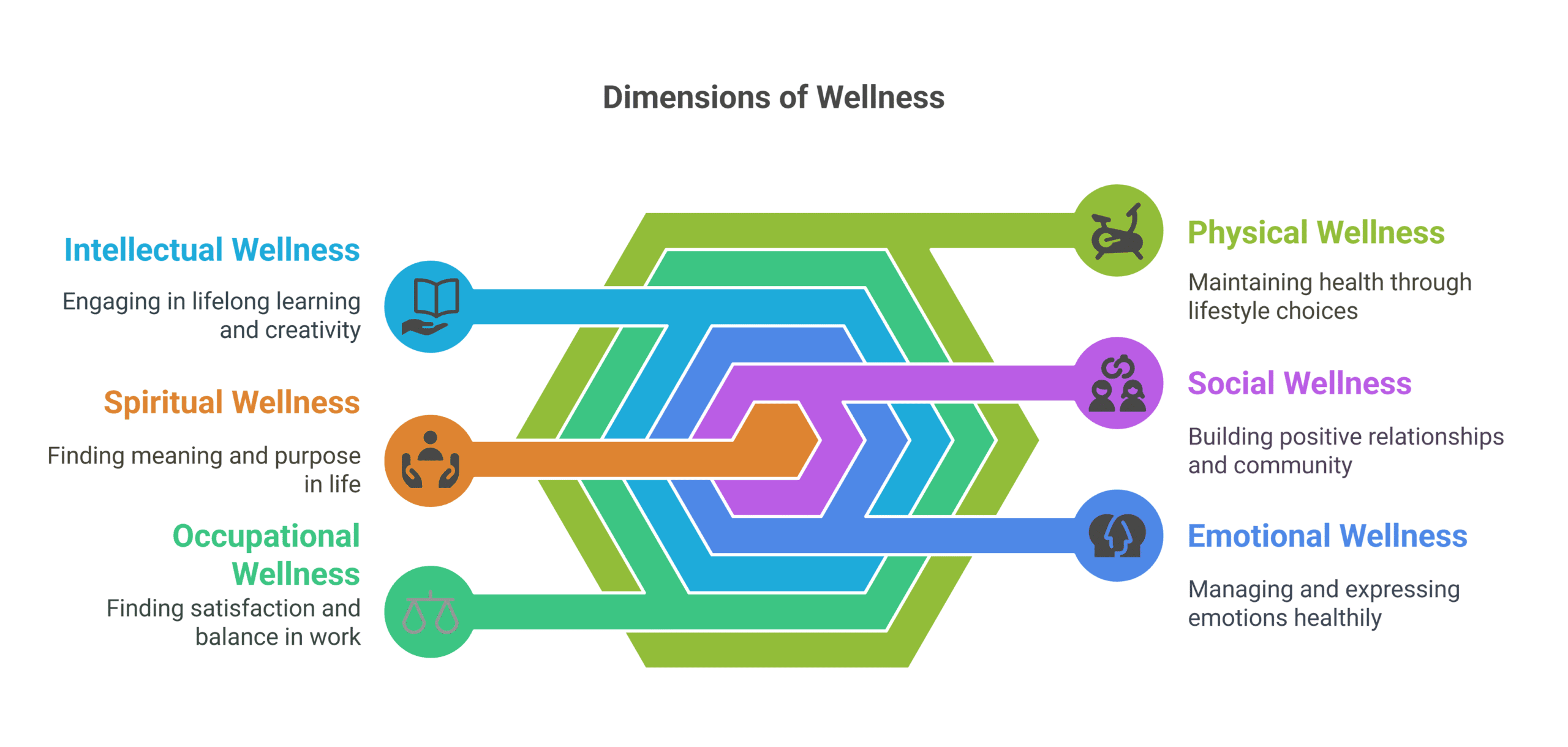
How Thoughts and Emotions Affect Physical Health
Toxic thoughts can make you ill… literally.
How? By causing unnecessary stress that you may not even know about. Stress, anxiety, and negative thinking can cause:
- Headaches
- Digestive problems
- Eating disorders
- Fatigue
- Sleeplessness
According to research, good mental health can lower your blood pressure and maintain healthy blood sugar levels. Disturbing emotions can also tense your muscles. This can make your posture poor that can further cause back pain. As a result, you may become even more distressed emotionally.
Can You Notice if You are Out of Balance
Yes, you can. Here is a mini checklist of the common signs of an imbalanced wellbeing:
- Emotional eating
- Constant fatigue
- Foggy brain
- Feeling burned out
- Chronic pain
Sounds familiar? If yes, you may need to focus inside your mind a bit more.
Why do You Struggle to Achieve Balance
Because you don’t stop to think about yourself. In today’s society, we’re constantly “doing.” You may not have noticed, your day comprises of:
- Meeting work deadlines
- Hustling
- Fulfilling family commitments
- Fielding societal expectations
- Completing one chore after another
- Ticking off to-do lists
Just sit back for a moment and think…
When was the last time I was “just there?” How can I achieve a balance between mind and body? This constant “doing” without time for “being” can overwhelm you. Eventually, you might start dreading going to work. As a result, you may procrastinate or lose creativity because of the slow burnout.
[Anecdote] Always trying to achieve more can exhaust you and cause a severe mind-body imbalance.
The worst thing… [you may grow irritable](https://www.sciencedirect.com/science/article/pii/S2352914823000680#:~:text=However%2C work-life imbalance can,productivity [14%2C15].) and strain your relationships.
Why can’t you stop? You may have been pushed to work harder and achieve more from the early age. Although it is good for a short period, you shouldn’t make it a life long lesson.
Unhealthy Responses
When you cannot relax your mind, these issues may develop:
- Emotional Eating
- Procrastination
- Substance Use
- Sleeplessness
- Uncontrolled anger
These are unhealthy coping strategies in response to constant stress on your nervous system. Your mind attempts to soothe hidden anxiety, depression, or other emotional issues. These habits are symptoms of a deeper problem you cannot fix on your own.
How Stress Hijacks Your System
This is what happens when you keep stressing for a long time:
- [Your body releases cortisol](https://pmc.ncbi.nlm.nih.gov/articles/PMC6371989/#:~:text=RESULTS%3A,an increase supporting this increase.), “the stress hormone”. It prepares your body for “fight or flight.”
- Since your body always remains in this mode, you might become jumpy and distracted.
- The more high alert you become, the more stressed your mind gets.
- As a result, you cannot relax and may develop more mental and physical issues.
Medicines or energy supplements might be quick fixes. However, they are not long-term. Your anxiety may return once their effects wear off.
[Anecdote] Treating the symptoms cannot really treat the disorder.
You don’t need a temporary relief, but a treatment that recognises and resolves the root cause of your stress.
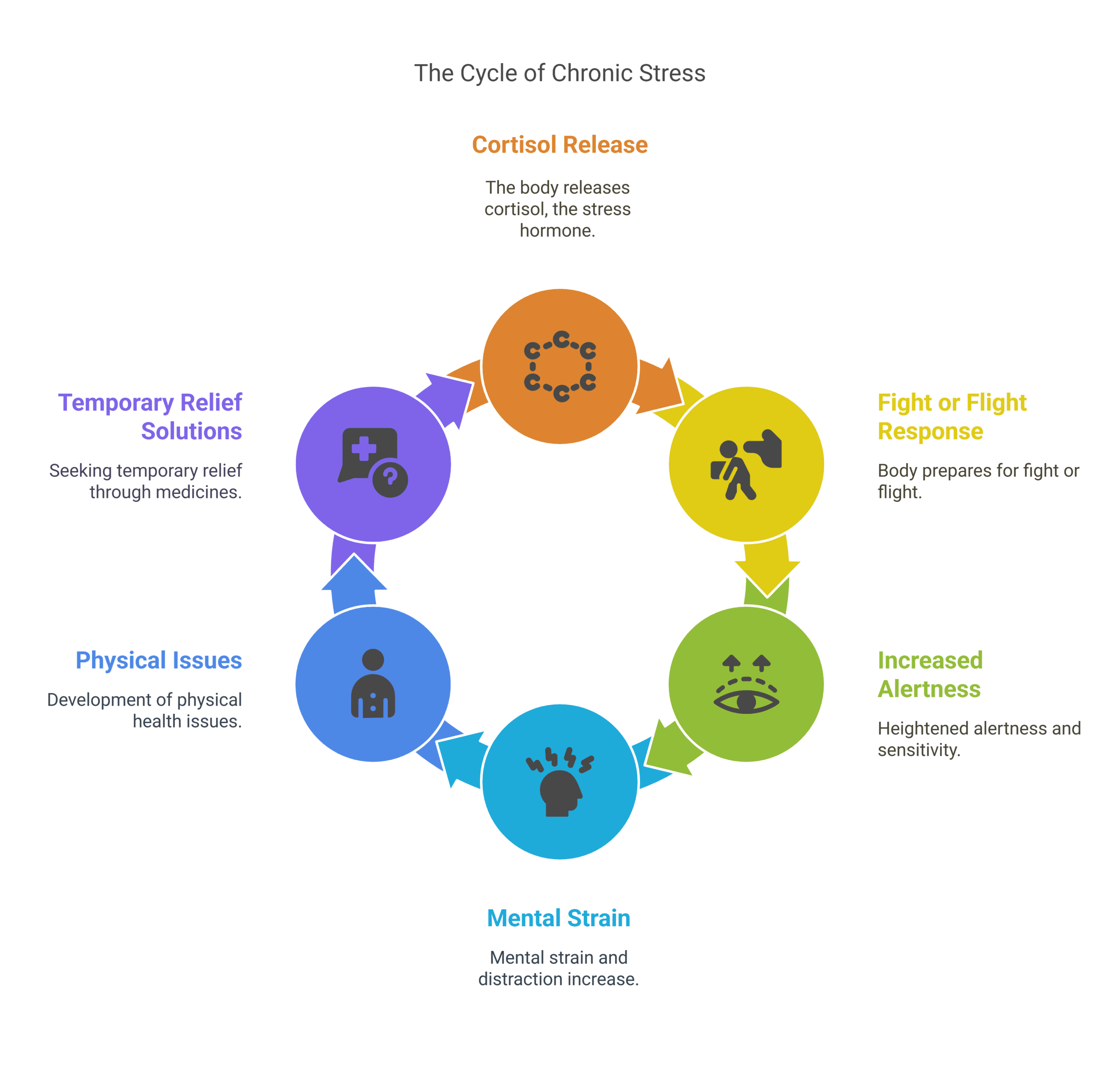
Popular Treatment Methods for Mind-Body Wellness
There are several answers to your question: “How can I achieve a balance between mind and body?” Various treatment methods focus on mind-body wellness to improve your mental clarity and physical health. Here are some popular approaches:
Meditation
Meditation and mindfulness practices focus on being present in the moment. You cultivate awareness of thoughts, feelings, and physical sensations. This helps calm your mind and center it on one thought.
- Pros:
- Improves emotional regulation and self-awareness.
- Relaxes your mind and body.
- Reduces stress and anxiety over time.
- Cons:
- Requires consistent practice for significant benefits.
- Focusing can be difficult for beginners, especially those with high anxiety or trauma.
- May be difficult to maintain long-term without proper guidance.
2. Diet and Exercise
A healthy diet and regular exercise routine are necessary for supporting physical and mental health. Proper nutrition and exercise help you maintain energy levels, improve your mood, and better wellbeing altogether.
- Pros:
- Builds physical fitness, energy levels, and body health.
- Establishes a structured routine for self-discipline.
- Supports mental clarity and emotional stability through physical activity.
- Cons:
- Often unsustainable without addressing underlying mindset or habits.
- Can create cycles of guilt or stress when goals aren’t met.
- May lead to burnout if you don’t engage in self-care practices.
3. Psychotherapy and Talk Therapy
Psychotherapy and talk therapy are professional treatment methods. These techniques help you analyse your thoughts, emotions, and behaviours. These treatments allow you to gain deeper self-understanding and improve your relationships.
- Pros:
- Helps develop conscious understanding of personal issues and challenges.
- Provides relationship insight that strengthens communication and connection.
- Supports personal growth through self-reflection and the therapist’s feedback.
- Cons:
- Results may be slow and require a long-term commitment.
- Does not always result in immediate behavioural change.
- May not be effective if a there isn’t a good client-therapist rapport.
4. Medication
Medicines are commonly used to manage symptoms of mental and physical health conditions. These can provide quick relief. As a result, you can engage in other wellness practices more effectively.
- Pros:
- Can offer rapid symptom relief for anxiety, depression, or sleep disorders.
- Provides stability if you are struggling with severe mental health problems.
- Can be applied with other wellness treatments for a holistic approach.
- Cons:
- Potential side effects that may affect overall health.
- Risk of dependency or over-reliance on medication.
- Does not eliminate the hidden root causes of mental or physical issues.
What Sets Hypnotherapy Apart?
First of all, you should ask “What is hypnotherapy and how can I achieve a balance between mind and body using it?”
Unlike other treatment methods described above, hypnotherapy works directly with your subconscious mind. The subconscious controls 95% of your behaviour. It stores the beliefs, memories, fears, insecurities, and experiences that shape how you think and act.
[Anecdote] Most of your negative thoughts stem from the subconscious.
The most interesting thing is… you don’t know about it!
Hypnotherapy is a treatment method that helps you recognise and reprogram these negative emotions into positive ones. It allows you to pin point the root causes of mind-body imbalance i.e. deep-seated fears and anxieties.
Once you find out the actual cause, you can plan a healthy coping strategy.
The Science Behind It
Clinical research supports the effectiveness of hypnotherapy for Irritable Bowel Syndrome (IBS), weight loss, anxiety, and pain. Studies have shown that [hypnotherapy can positively influence brainwaves](https://pmc.ncbi.nlm.nih.gov/articles/PMC4361031/#:~:text=Hypnosis has been most closely linked to,theta band and changes in gamma activity.&text=In addition%2C given the preliminary evidence that,may be related to these phase-linked mechanisms.) and promote neuroplasticity.
A Comparison of the Popular Mind-Body Balance Techniques
| Characteristic | Hypnotherapy | Meditation | Diet & Exercise | Psychotherapy | Medicines |
|---|---|---|---|---|---|
| Symptom Relief | Rapid, effective relief for anxiety, stress, and phobias | Gradual reduction in stress and anxiety | Boosts energy and mental clarity | Can alleviate emotional distress | Quick symptom relief |
| Emotional Regulation | Enhances emotional control by reprogramming the subconscious mind | Improves emotional stability | Supports mental well-being | Improves emotional understanding | Stabilizes emotional symptoms |
| Behavioral Change | Targets deep subconscious patterns, helping to change habits and behaviors | Fosters awareness and mindfulness | Encourages healthy habits and routines | Promotes personal growth and insight | Helps with managing symptoms but not root causes |
| Mental Clarity | Improves focus, reduces mental fog, and enhances cognitive function | Cultivates inner peace and calm | Enhances cognitive function | Provides insight into thoughts and feelings | Often improves focus in the short-term |
| Physical Well-Being | Can improve sleep, reduce physical tension, and support immune function | – | Boosts physical health and vitality | – | – |
| Accessibility | Requires skilled practitioner, not always widely available | Easy to practice, but may require guidance | Often requires resources or support | Requires regular sessions, can be hard to access | Prescription-based, may not be easily available |
| Time to See Results | Quick, but requires follow-up sessions | Slow results, requires consistent practice | Long-term results, can fluctuate | Slow, often long-term process | Fast but often requires ongoing use |
| Consistency Required | Intensive sessions, occasional follow-up | Requires daily commitment for effectiveness | Requires lifestyle change and discipline | Regular sessions and commitment over time | Ongoing use, potentially lifelong |
| Side Effects/Complications | Minimal, but dependent on practitioner skill | Can be difficult for beginners, may lead to frustration | Can lead to burnout or injury if not managed properly | Can stir up difficult emotions, triggering | Side effects, dependency risk |
| Sustainability | Long-lasting if practiced properly | Sustainable if incorporated into daily routine | Often unsustainable without a mindset shift | Sustainable, but requires consistent effort | Can be over-relied on for symptom management |
Takeaways from the Comparison:
- Hypnotherapy is highly effective for quick and long-lasting symptom relief both emotionally and behaviourally. It can also reduce physical tension, improve sleep quality, and affect physical wellbeing positively.
- Meditation benefits emotional regulation and mental clarity. However, it requires regular practice for sustainable results.
- Diet & Exercise supports physical and mental health. Nevertheless, maintaining a consistent routine can be difficult without a positive mindset.
- Psychotherapy is deeply transformative for emotional growth. You must be treatment-compliant for a long time, though… even years.
- Medicines offer fast relief but come with potential side effects and dependency risks. Also, they do not treat the root causes of poor mental health.
Multi-Technique Approach to Lasting Mind-Body Balance
At Make it Happen Hypnotherapy (MIHH), we integrate a range of therapy methods to address the mind-body connection holistically. This makes sure long-term healing and balance.
Hypnosis
Hypnosis is the method hypnotherapists use to help you slide into a trance-like state. You can focus on the inside of your mind to reach the subconscious. Once there, you can identify and reprogram limiting beliefs, toxic thoughts, and unresolved emotional issues. Through this method, we help clients reach their true potential and become more productive to achieve their goals.
NLP (Neuro-Linguistic Programming):
NLP is a powerful tool for breaking free from self-destructive behaviours. Do you think smoking, binge drinking, or doom scrolling can help you manage stressful situations? Addiction can only push negativity away for a short period. Additionally, it has several physical and mental side effects.
Neuro-Linguistic programmers help you improve how you “talk” about yourself inside your mind. You may not develop confidence and productivity if you keep thinking, “I am a failure.”
[Anecdote] NLP changes your ‘can’t do” thoughts to “can definitely do.”
By altering your inner dialogue, NLP helps reframe negative thought patterns. That way, you can face challenges with a stronger mindset. This can also transform how you perceive and respond to different situations.
Havening Techniques
Havening techniques clear emotional trauma and stress triggers. This approach uses gentle touch along with specialised mental exercises. You can release the pent-up emotions because of past experiences. It reduces anxiety and improves emotional regulation for a balanced, peaceful mind.
Are you wondering, “How can I achieve a balance between mind and body through Havening?” Once your negative emotions are released and resolved, you feel lighter physically and mentally. The more relaxed you feel, the more aligned your thoughts and actions become.
Breathwork
Breathwork techniques regulate the nervous system through controlled breathing.
How does simple breathing heal you? Different breathing patterns stimulate or calm your body. Breathwork reduces stress and increases self-awareness to your body’s sensations. It builds a deeper mind-body connection and you become more emotionally resilient.
[Anecdote] Hypno Breathwork combines hypnosis and breathing for quick healing.
Coaching
Coaching provides the structure and accountability you need to turn post-therapy insights into goal-achieving actions. With personalised guidance, we help clients build and maintain healthy habits.
As a result, they can achieve their goals and keep a sustainable mind-body balance in everyday life.
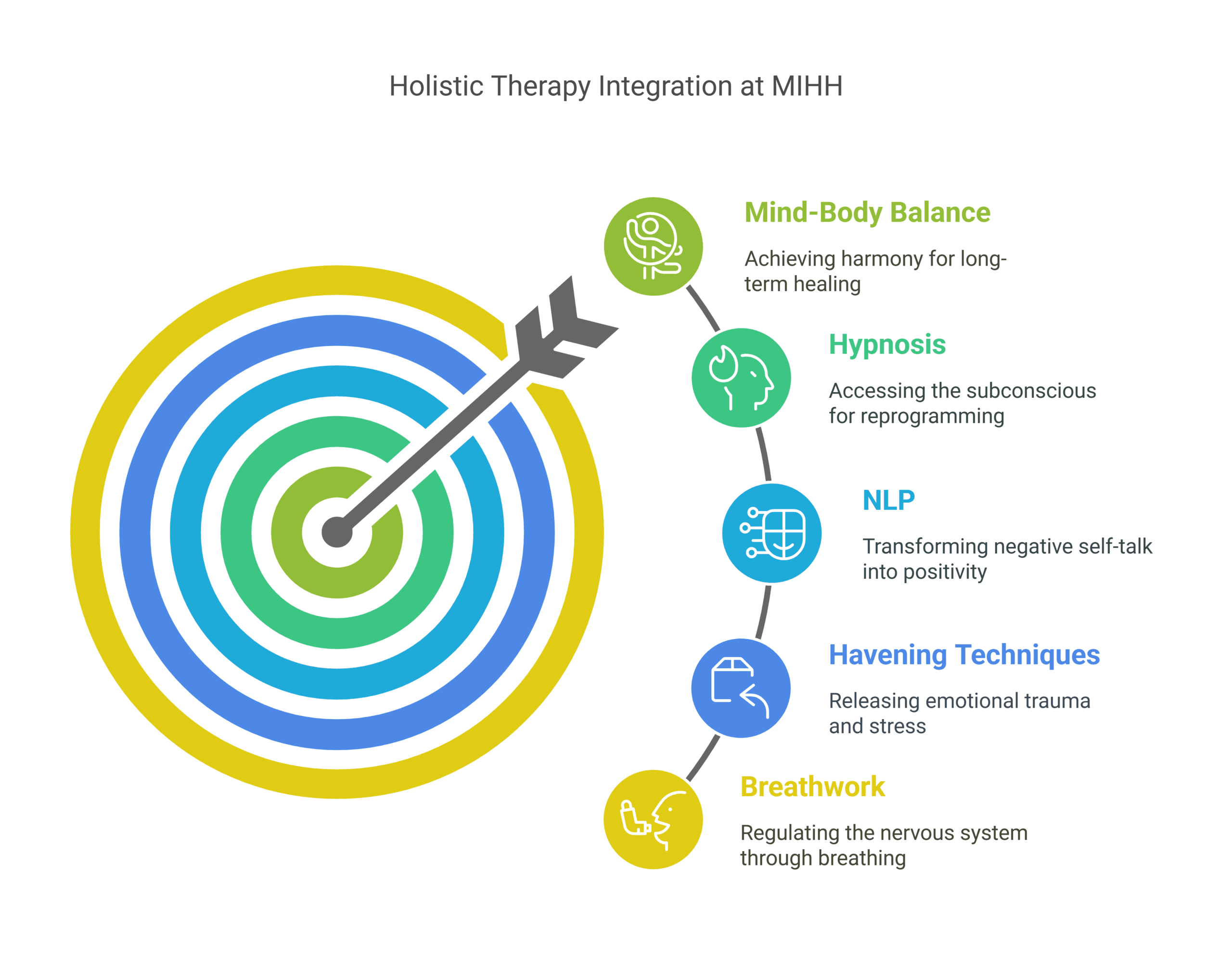
Hypnotherapy in Action: Applications Across the Body-Mind Spectrum
Hypnotherapy heals your mind and body. You break free from toxic, restricting thoughts and various physical and mental illnesses.
Weight Loss and Emotional Eating
Hypnotherapy reshapes the negative subconscious beliefs that develop unhealthy eating habits. You can develop a better association with food if you eliminate your hidden insecurities.
Techniques like gastric band hypnosis copy the effects of bariatric surgery. You may feel full after eating a smal portion…without undergoing a surgical operation. This method works on:
- Helping you adopt sustainable weight loss strategies.
- Changing your mental association with food
- Reducing sudden cravings
- Reinforcing long-term healthy eating habits
Irritable Bowel Syndrome (IBS)
The gut-brain connection is a well-documented phenomenon. Hypnotherapy targets this link to relieve you from the symptoms of IBS.
You can reach into your subconscious to identify and resolve underlying emotional triggers that disrupt your digestive system. Hypnotherapy uses illness-focused suggestions to reduce the frequency and severity of IBS symptoms like:
- Bloating
- Pain
- Irregular bowel movements
Sleep Disorders
These happen mostly because of:
- Anxiety
- Depression
- Overwhelming stress
- Fears and insecurities
Hypnotherapy is a non-invasive method that resolves these hidden causes. Once you clear mental blocks, sleep can become better immediately.
This therapy helps restore your mind-body balance. Were you wondering, “How can I achieve a balance between mind and body?” Hypnosis lets the mind and body to let go of tension before sleep. If you are struggling with insomnia, nightmares, or stress-induced sleep disturbances, hypnotherapy can be your solution.
10 Steps to Achieve Mind-Body Balance
You can live a positive life if your physical and emotional wellbeing align. Here are 10 steps to balance them:
1. Build Subconscious Awareness
Your subconscious stores all the emotions and automatic responses you build throughout your life. You can be more mindful if you are aware of your subconscious thoughts.
Also, you can self-reflect more. That way, you can get more insight into your thoughts and behaviours.
2. Improve Sleep Through Hypnotic Priming
Sleep is important to maintain mind-body harmony. You can use hypnotic priming to improve it. Hypnotic priming is a series of relaxing suggestions. They prepare your mind to slide into a trance-like state, i.e. hypnosis.
You might ask here, “How can I find a balance between mind and body with this technique?” If you self-suggest before sleeping, you can reduce insomnia and anxiety. Also, your body can become calm enough to repair itself during sleep.
3. Think of Food as Fuel, Not a Fix
Do you eat whenever you feel overwhelmed by emotions? Food is not a “fix” or punishment for guilt or stress. Instead, you may face several physical and mental issues like:
Due to unhealthy eating.
[Anecdote] Shift your perspective to see food as fuel for your body.
This mindset change can help you make healthier choices without emotional baggage. When you stop making food your emotional controller, your body and mind may become more energised and stable.
4. Use Exercise to Improve Self-Worth
Regular physical movement means that you respect yourself enough to stay healthy. Procrastination and lethargy can tell that you are not happy with yourself in some way you don’t know.
Again, committing to exercise needs a mind shift. Don’t think of it as “something I have to go through somehow”. Instead, think, “I have to do it for my own good.” This POV can make physical activity easier for you.
5. Train the Brain to Respond (Not React) to Stress
Yes, responding and reacting are two different actions. A response is more rational, while a reaction can mean:
- Impulsiveness
- Emotional outbursts
- Aggression
Stress is an inevitable part of life. Nevertheless, your response/reaction can make all the difference. Training your brain to respond thoughtfully rather than react impulsively is good for mind-body balance. Mindfulness, deep breathing, and hypnotherapy can help break negative automatic stress responses.
6. Build More Inner Self-Awareness
Do you suddenly feel empty inside despite having a busy schedule? That can happen because you haven’t self-reflected enough.
External pressures, deadlines, problems, and commitments can take up all your time. However, not connecting with your inner self can exhaust you eventually.
[Anecdote] Your subconscious needs as much attention as your conscious mind.
You should actively block time to spend alone, turning inside your mind to sort through the rubble of toxic thoughts and feelings stored there. Regular self-cleansing can relax you and answer your potential question, “How can I find a balance between mind and body.”
7. Heal the Wounded Child Inside You
Many emotional challenges are rooted in unresolved childhood trauma, fears, or insecurities. However, it doesn’t mean you blame your elders and get more angry.
Healing your inner child means that you acknowledge those hurts. Once you do that, you can release those pent-up emotions and resolve them eventually. You may feel lighter, more free, and more relaxed to pursue your goals.
Hypnotherapy can help you break old emotional patterns and make peace with your past. This can also improve your relationships in the long run.
8. Build a Life Rhythm You Enjoy
Everyone’s rhythm is different. Your rhythm may not be strict routines but flexible time blocks. Learn which routine and recurring healthy activities align with your needs and goals.
This means carving out time for work, rest, entertainment, and relationship-building without guilt or overwhelm. When you build a life you genuinely enjoy, you can sustain energy in all aspects.
9. Get Support – You Weren’t Meant to Do It Alone
Has “How can I find a balance between mind and body?” become a burning dilemma for you? Gather reinforcements, then. Get help from a therapist, a coach, or a supportive community. They can encourage you to stay on the healing track.
When you surround yourself with people who support your journey, it becomes easier to face challenges. Remember, you don’t have to do it all on your own.
[Anecdote] Good wellbeing is both an individual and a joint effort.
10. Trust the Process
Mind-body balance is an ongoing process. You must invest time, patience, self-compassion, and a willingness to trust the process.
Even when progress feels slow or non-existent, keep practising your healthy routine. Stay curious about your personal growth and recognise the changes that come with it. The more you trust in your evolution, the more you can experience the fullness of life.
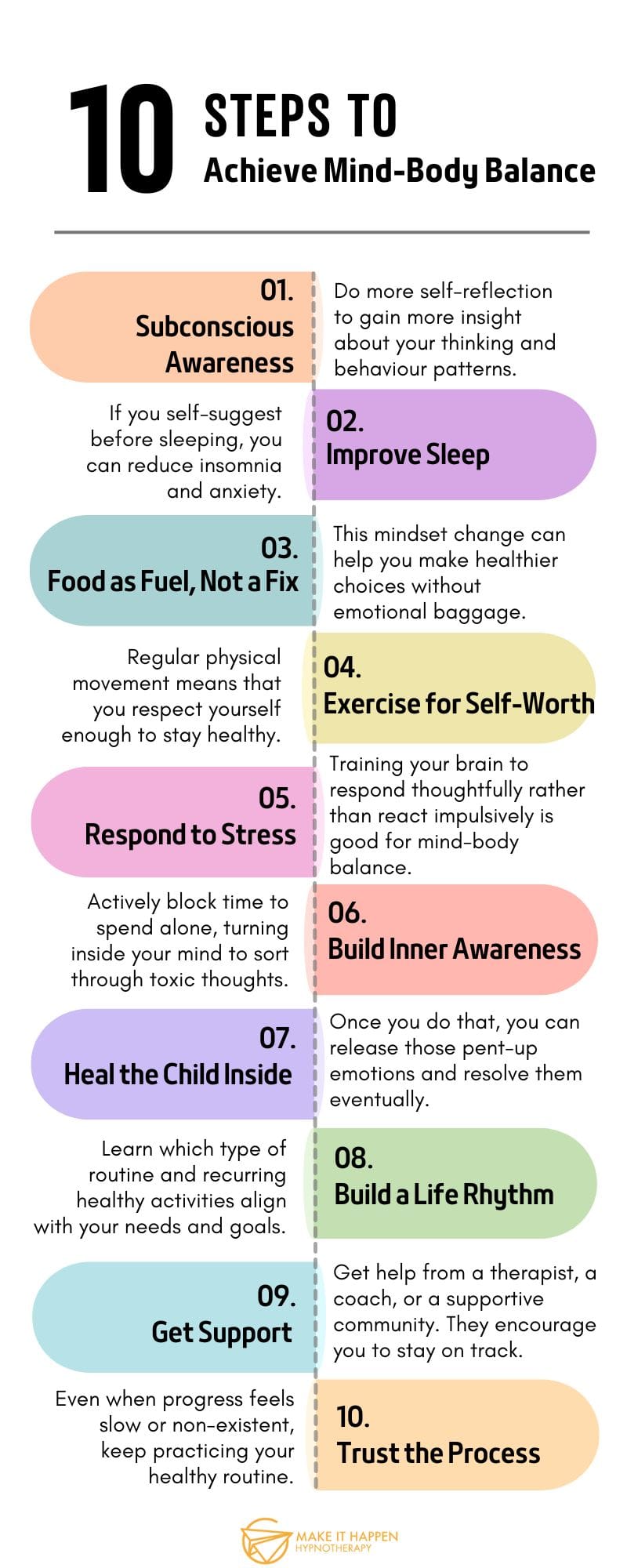
Myth-Busting Common Fears
Traditional therapies ignore the subconscious mind which decides your behaviour in different situations. However, you may be skeptical of hypnotherapy because of some myths surrounding it. Let’s bust them together:
- You are not in control during hypnosis.
False. Therapeutic Hypnosis or hypnotherapy is far different from stage hypnosis. A patient is active participant in entering hypnosis, and the hypnotherapist is the guide to help the patient enter the hypnosis trance state.
A hypnotherapist can’t put any client under a “spell” to do things against their will or act in a way they don’t want to act. You are in control of your hypnosis session at all times. You have the power to emerge from your relaxed state at any time.
- Only Mentally Weak People Can Be Hypnotised.
False. You cannot be hypnotised against your will, All it takes is willingness, paired with enough concentration to follow simple instructions.
The use of suggestibility in hypnosis is not related to weakness or being submissive. Studies show that people of above average intelligence, who have great creativity and a vivid imagination usually are the best subjects.
- A hypnotherapist can cure you in a single session.
This can happen. But a lot of times might not a permanent result. Most behavioural change requires more dedication and persistence to produce lasting results.
When working with a hypno-psychotherapist, be prepared to commit to least 4-5 sessions for a singular issue for long term positive changes.
If you want to know about more myths, read this blog.
Why Working with a Trained Professional Matters
You should select a certified hypnotherapist who is trained in multiple techniques and has experience in addressing the specific issues you are facing.
Choosing a Suitable Hypnotherapist
Besides checking credentials and years of experience, here are a couple more tips to find a good hypnotherapist:
- Google Reviews: This is the most used platform to check anyone’s trustworthiness.
Go for therapists with a high rating: A general 5/5 rating might mean that a particular hypnotherapist’s clients are comfortable with their treatment method and attitude.
Read multiple reviews: Read both good and bad reviews to get an idea of the therapist’s strengths, weaknesses, and methods. Find detailed reviews rather than one-liners.
Look for reviews from clients with similar issues to yours: This can help you find out how a particular hypnotherapist has helped others with the same needs.
- Professional institutions: Several professional organisations, i.e. Australian Hypnotherapists’ Association, and Havening Techniques Directory have directories of licensed therapists.
- Ask for referrals: Use the power of Word of Mouth, too. Ask friends or see recommendations from relevant Facebook groups. You can find detailed pros and cons of many hypnotherapists there.
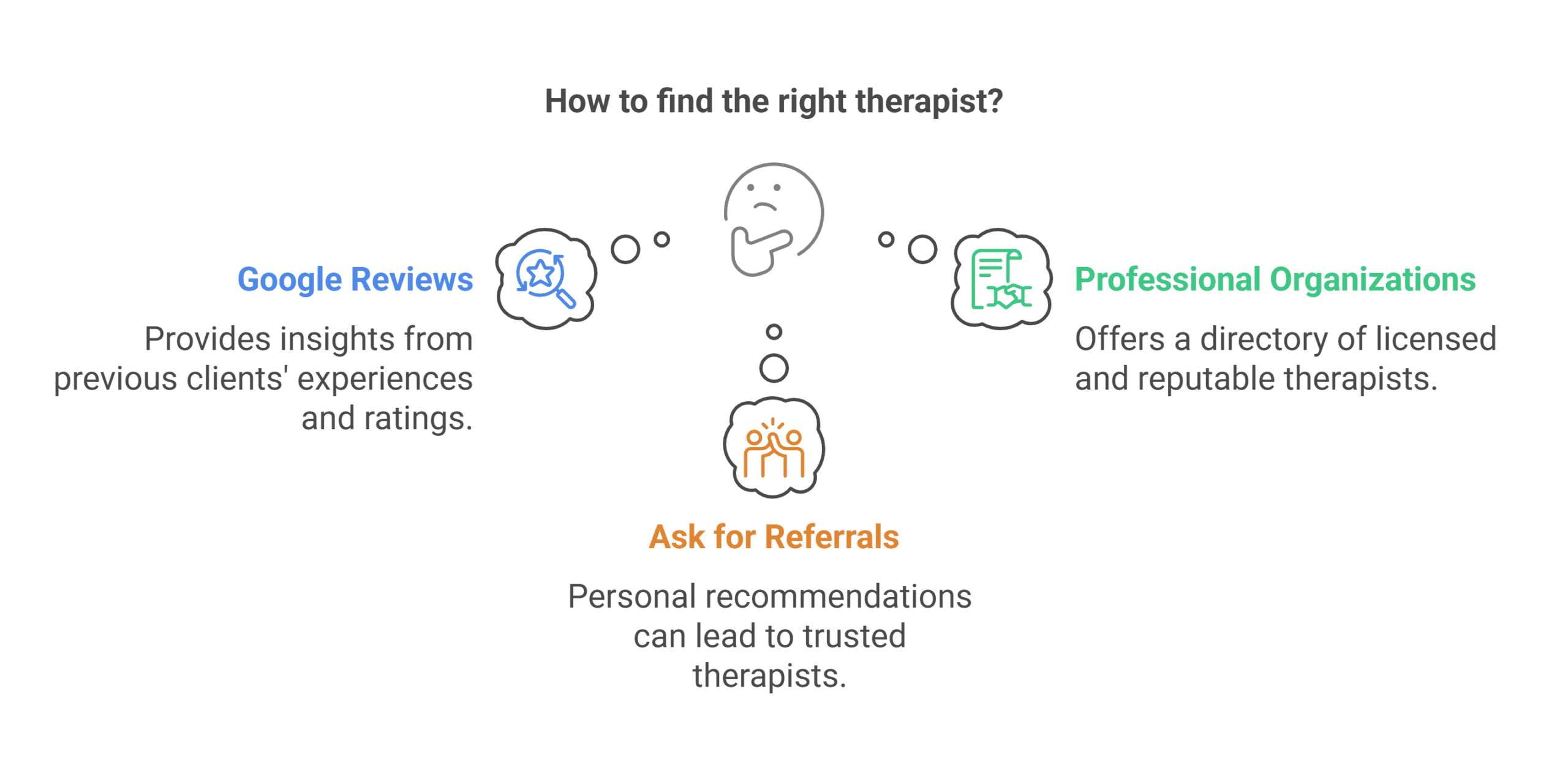
Why Clients Choose MIHH
Because we are:
- Quite experienced. Our lead hypnotherapist, Sandy, has been helping clients for almost a decade. MIHH has also treated and satisfied 700+ people.
- Highly confidential. Whatever you tell us stays with us.
- Stoked to let you plan your therapy process with us. You can identify which problems you want to go for first or last.
- Thoroughly non-judgemental. You can tell us anything and everything. We will always be empathetic and supportive towards you.
- Pros at making you comfortable. You will always feel safe with us.
- We offer a free strategy session. We discuss how many sessions you need to resolve your issue. We also discuss how your therapy would go, what you want to address, and what to expect from this treatment.
Some Glowing Reviews
DQ just loves Sandy’s approach:

Client Wu had an amazing experience at our breathwork session:

S.S. stopped taking medication after taking sessions at MIHH:

Book Your Free Consultation Today
We are just a click away.
You can open up as much as you want. You will be in a safe space where no one will dismiss your problems.
Call 047-515-9415 today to start balancing your mind and body for a better life.
In a Nutshell
If you wonder “How can I achieve a balance between mind and body?” Hypnotherapy offers a powerful, mind-based answer. Your subconscious can either relax or overwhelm you. For a good mind-body balance, you should focus on building inner self-awareness and mindfulness. MIHH can empower you to make positive changes in your health, habits, and wellbeing.
FAQs on “How Can I Achieve Balance Between Mind and Body”
Can Hypnotherapy Help With Chronic Stress?
Yes, hypnotherapy can help with chronic stress by reprogramming your subconscious mind. It allows you to find the root causes of anxiety and resolve them into positive emotions. Once that happens, your concentration and productivity increase, and the stress decreases.
What are the Signs of Being Out of Balance?
The signs of being out of balance are Fatigue, cravings, brain fog, continuous stress, and muscle tension. This imbalance between the mind and body can make you less productive in your career, relationships, and personal life. Hypnotherapy, conventional therapies, and a healthy diet can balance your physical and mental wellbeing.
How Long Does it Take to See Results from Hypnotherapy?
It may take 4-6 sessions to see positive results from hypnotherapy. Although there are rumours that hypnosis can treat illnesses in a single session, you need to attend the complete therapy program to enjoy long-term changes. The period depends on the severity of the disorder and the client’s compliance with treatment.
Is Hypnotherapy Safe?
Yes, hypnotherapy is a safe, non-invasive treatment when performed by a trained professional. The National Library of Medicine has found it to be positively effective in treating pain and pre-surgery anxiety.
Can Hypnotherapy Help With Weight Loss?
Yes, hypnotherapy can help with weight loss. Your unhealthy eating habits result from subconscious fears and insecurities. Hypnotherapy allows you to replace negative thoughts with positive ones by reaching into your subconscious. As a result, you can build healthier eating habits and support sustainable weight loss.








